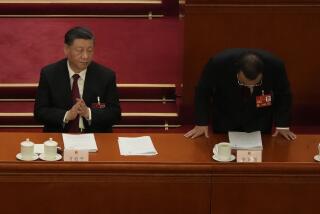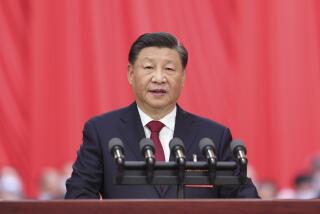China to Learn From West--but Won’t End Socialism
- Share via
BEIJING — China intends to learn from Hong Kong and Western countries in building a stronger economy, but this does not mean that the country is abandoning socialism, Premier Li Peng said Monday.
“In the course of reform and opening to the outside world, we will draw on some of the worthwhile experiences and methods of Western countries,” Li said during a press conference at the Great Hall of the People. “But whatever is done must be appropriate for the actual conditions of China.”
Speaking specifically of the role played by Hong Kong as a model for Chinese development, Li stressed that China does not plan to copy Hong Kong’s entire economic and social system.
“Hong Kong will keep its current capitalist system and the Chinese mainland will cling to its socialist system,” Li said.
But Li said there is much China can learn from the British colony, which is due to revert to Chinese sovereignty in 1997.
Hong Kong Experiences
“If some regions and cities . . . want to experiment with or draw on some of the experiences of Hong Kong in order to reach the same level of prosperity as in Hong Kong, I think this is understandable,” he said.
Li, speaking in a similar fashion about political reform, said that China will gradually institute greater democracy, but that democratization must not proceed too quickly or too far.
“If the democratic process is not well attended to--say if work in this regard is carried out in haste or to an excessive extent--then it will certainly affect the situation of unity and stability,” the premier said. “If the stable situation is undermined then it won’t make our work of construction of reform smooth.”
China also will not copy the political reforms now under way in the Soviet Union, Li added. “China’s conditions are different from those in the Soviet Union, and we cannot copy the Soviet Union’s methods,” he said.
In a speech two weeks ago at the opening of the current 16-day annual session of the National People’s Congress, Li spoke at length about errors made last year in economic policies. He was especially critical of a failure to take action quickly enough to fight inflation, which according to official statistics ran at 26% in 1988. Inflation, which has run at an even higher rate for food and other daily necessities, has aroused widespread dissatisfaction.
At Monday’s press conference, Li stressed that the mistakes made last year came “in the course of progress and development.”
Li also pointed out that major policy decisions in China are made by the Communist Party Politburo and its Standing Committee. The State Council, China’s Cabinet--which he heads as premier--is responsible for implementing these decisions. He said that he shares responsibility for errors last year but that the responsibility is not his alone.
China’s three vice premiers--Yao Yilin, Tian Jiyun and Wu Xueqian--also appeared at the press conference and spoke in response to a few questions that Li turned over to them.
Yao, answering a question about a controversial proposal to build a huge dam that would flood the scenic Three Gorges section of the Yangtze River, said that both supporters and opponents of the project have “strong arguments.” More study is needed, he said, but in any case, China’s economic situation will not allow the project to be started anytime during the next five years.
“I think now we can stop arguing about this project for a while,” he concluded.
More to Read
Sign up for Essential California
The most important California stories and recommendations in your inbox every morning.
You may occasionally receive promotional content from the Los Angeles Times.













